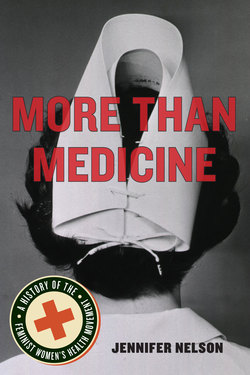More Than Medicine

Реклама. ООО «ЛитРес», ИНН: 7719571260.
Оглавление
Jennifer Nelson. More Than Medicine
More Than Medicine. A History of the Feminist Women’s Health Movement
Contents
Acknowledgments
Introduction
1 “Medicine May Be the Way We Got in the Door” Social Justice and Community Health in the Mid-1960s
2 “Thank You for Your Help . . . Six Children Are Enough” The Abortion Birth Control Referral Service
3. Reproductive Control, Sexual Empowerment. The Aradia Women’s Health Center and the Early Movement for Feminist Health Reform
4. Conserving Feminist Health Care, Confronting Anti-Abortion. The Atlanta Feminist Women’s Health Center
5 “All This That Has Happened to Me Shouldn’t Happen to Nobody Else” Loretta Ross and the Women of Color Reproductive Freedom Movement of the 1980s
6. Women of Color and the Movement for Reproductive Justice. A Human Rights Agenda
Notes
Index
About the Author
Отрывок из книги
Jennifer Nelson
NEW YORK UNIVERSITY PRESS
.....
L. C. Dorsey’s interaction with the Tufts-Delta Health Center characterizes the way community involvement in medical services could help transform black people’s lives beyond simple health care provision. Dorsey was born on a plantation to sharecropper parents (just a generation removed from slavery) in Washington County, Mississippi. She grew up in neighboring LeFleur County without access to education or job experience except in the fields. As a teenager, Dorsey was a social activist—a self-described civil rights field worker—with the Council of Federated Organizations (COFO), the Student Non-Violent Coordinating Committee (SNCC), and the Southern Christian Leadership Conference (SCLC). From her involvement in the civil rights movement, Dorsey heard about the Tufts-Delta Health Center and was intrigued because she wanted to become engaged with a project that would be sustainable. She explained that she was hired to be a part of community health outreach with the center. Dorsey said that Hatch, at that time director of Community Health Action at the health center, wanted to give young people the chance to grow in the organization, so he hired people with little or no work experience. After a stint as an outreach worker, Dorsey applied to direct the community farm associated with the clinic. Again, she noted she had no direct experience but was given an opportunity to develop her skills on the job. She also utilized Delta Health Center resources to complete her high school degree at the local junior college. Dorsey made clear that her work with the health center helped build her confidence to the point that she eventually completed an undergraduate degree and attended SUNY–Stony Brook for her master’s in social work. Ultimately she completed a Ph.D. at Howard University and returned to the center to become its executive director in 1988.88
Most of the Delta Health Center patients were women, children, and elderly men. Because there was so little paid labor in the South, many young men migrated north to find jobs. As a result of out-migration, the average age of Mound Bayou residents was only about fifteen, and the average age of men in the community was about fifty. Thus, women and their children were very much at the center of the Tufts-Delta Health Center as both patients and workers.89 With so many women in the community, obstetrics and gynecology were essential specialties at the health center. Two white nurse midwives, one a nun, Sister Mary Stella Simpson and Asa Johansen, both of whom joined the clinic when it opened its doors, worked in this area. The first black female obstetrician/gynecologist to practice in Mississippi, Dr. Helen Barnes, also joined the center in 1968. When she arrived at Mound Bayou, Barnes set up a program for prenatal care, delivery, and contraceptive services, which was supported after 1970 with federal funds accessed through Title X, a program created by President Nixon to promote family planning among poor Americans.90 Born in Mississippi, Barnes left the state to earn her medical degree from Howard University in Washington, D.C. After completing her degree in 1958, she returned to the Mississippi Delta to serve as one of the few black general practitioners in Greenwood, Mississippi. After returning north to complete specialty training in ob/gyn at Kings County Hospital in Brooklyn, New York, she joined the Tufts-Delta Health Center.91
.....